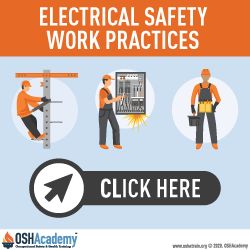Safe Work Practices
Your employer is required to make sure that electrical equipment, including extension cables and other flexible leads, which are particularly prone to damage to plugs, sockets, and to their connections, are regularly inspected and maintained by a competent person.
Here is a brief list of safe work practices for employees working in healthcare settings:
- Inspect electrical equipment and cords before each use and report any defects, damage, or excess wear immediately.
- Follow lockout/tagout procedures when servicing or repairing electrical equipment to prevent accidental energization.
- Ensure that all electrical equipment and appliances are properly grounded to prevent electrical shocks.
- Avoid using extension cords whenever possible; use fixed wiring instead. If extension cords are necessary, use only those designed for healthcare settings and ensure they are in good condition.
- Do not overload electrical outlets with multiple devices or adaptors. Use power strips with built-in circuit breakers if needed.
- When using electrical medical equipment, follow manufacturer instructions, and ensure it is properly maintained.
- Keep electrical equipment away from water sources, and do not operate electrical devices with wet hands.
- Know the location of emergency shut-off switches and fire extinguishers, and be prepared to respond to electrical emergencies.
- Ensure that all staff members are trained in electrical safety procedures and know how to respond to electrical emergencies.
- Report any electrical hazards, malfunctions, or unsafe conditions to appropriate personnel immediately.
- When working around patients, be mindful of electrical cords and equipment to prevent tripping hazards.
- Ensure that electrical equipment is properly labeled, indicating its use and any special precautions.
- Avoid distractions while working with electrical equipment to maintain focus on safety.
- Take faulty equipment out of use immediately until repaired. Clearly label it as faulty or remove the plug to prevent use.
- Never clean or adjust appliances when the power is switched on.
- Never touch light switches or appliances with wet hands.
Knowledge Check Choose the best answer for the question.
1-4. When should electrical equipment and cords be inspected for defects, damage, or excess wear?
You forgot to answer the question!

